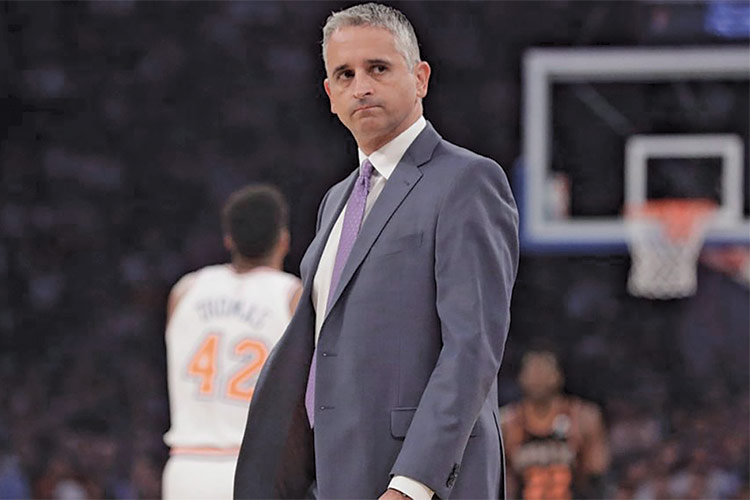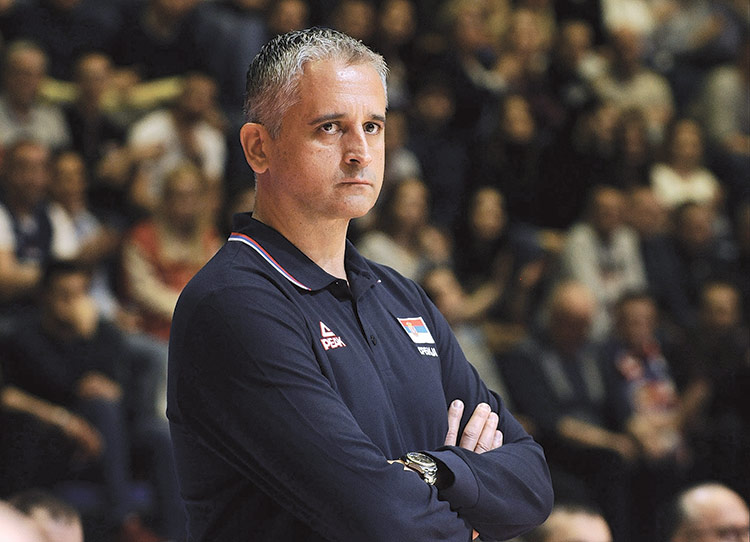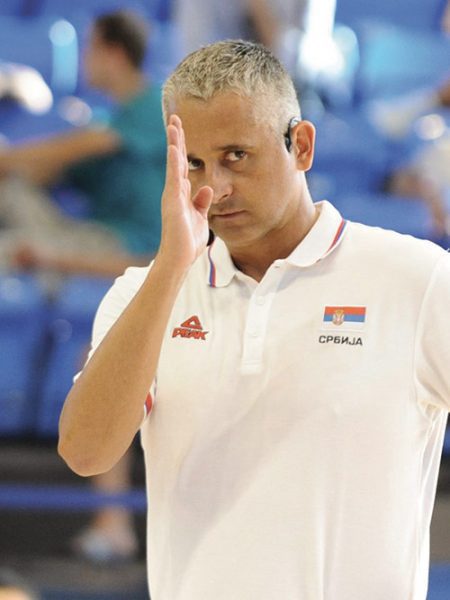Igor Kokoškov’s has had a unique path to success. He left the country that’s home to the biggest names in European coaching to study in America. Of course, there were plenty of people to learn from there too, although the approach to basketball is completely different. He worked with the younger categories of OKK Belgrade, only to become the coach of the first team in 1995 and the first coach from this region to work in the NBA in 1999.
Born in Banatski Brestovac 49 years ago, a serious car accident quickly ended Kokoškov’s playing career, which led him to start coaching when he was only 21. He entered the history books as the youngest strategist in the history of elite competition in Yugoslavia. He spent the following season working with the younger categories of Partizan, then later headed to the U.S. for professional training. Ambitious and hardworking, in 1999 he became an assistant coach at the University of Missouri, and by 2000 he had already joined the professional coaching staff of the Los Angeles Clippers.
He has broken records throughout his career as the youngest coach to achieve things, and all his work in America was crowned with a job at the Phoenix Suns, which saw him become the first coach not born in the U.S. to lead an NBA team. He won an NBA title in 2004, as a member of the Pistons’ professional coaching staff, but it was actually in Europe that he achieved the greatest success of his career so far, winning the title of European champion with Slovenia in 2017, and by beating none other than Serbia in the final. Prior that, his achievements as the head coach of Georgia led to him being decorated by the country’s president. He became the head coach of Serbia’s national in 2019, while he has also been the coach of Fenerbahce since 2020.
Everything that he’s gone through in his career prompts the question of whether Kokoškov is more of a European coach or an American one.

“It’s a specific situation, as Americans mention that I was born in Serbia and in Europe they note that I am a student of America. I could conclude that no one wants me,” he says with a smile. “However, we must admit that the centre of events for basketball is the NBA and that I spent most of my career in America”.
What was the crucial factor in you returning to Europe and taking over the helm at Fenerbahce?
– Sporting motives and challenges were key. After the season at Phoenix Suns, I was in the professional coaching staff of the Sacramento Kings and those were excellent experiences. However, an opportunity arose to lead one of the clubs in the Euroleague and I decided to accept it. Of course, that doesn’t mean my NBA story is over. My life is in America. Fenerbahce is a big club, and therefore also a challenge. Basketball is now too globalised for us to separate Europe and America. When I was reaching agreement with the people from Fenerbahce, I didn’t have any special conditions or request a special budget.
Leading players can be compared to raising children. You have to know when yelling will yield the proper result, when it will, in a sporting sense, contribute to victory. Players must recognise that the coach knows what he’s doing and how he will lead them to victory
I knew there would be less money to bring in players than there’d been before, but I simply accepted the job. I didn’t seek anything special for myself, especially because I’m also under contract with the Phoenix Suns. By working in parallel as a coach and selector, I reached the situation where I haven’t had any kind of break for 12 years. I was aware of that when I arrived in Turkey, but I like that kind of challenge. Željko Obradović achieved great results in Istanbul. He’s a great coach and a friend of mine. I was his assistant with the national team. And he was always one of the people I consulted with when making important decisions. I also spent one summer as his guest at Fenerbahce. That’s when I met the people who run the club, which is a phenomenal organisation.
How much do coaching in the U.S. and Europe differ?
– I’ve learned something from every coach with whom I’ve worked. Plenty of things are different, even the duration of matches, time outs. One has to adapt, but also to be true to oneself, which is the most important factor.
The greatest Serbian coaches have mostly been strict. They also distinguished themselves with the authority of their knowledge, but also their stormy temperament. However, when watching Igor Kokoškov one doesn’t get the impression that he’s excessively strict and overbearing. Does Kokoškov ever yell at his players?
– “The essence doesn’t lie in yelling. Serbian coaches are great not because players feared them, but because they knew a lot about basketball. Now everything has become public, the cameras are constantly switched on. Basketball is changing as a sport. A man must be what he is, to be true to himself. I’m not a coach who will put on a show courtside. The role of a coach is different now. We Serbs had a professional approach to this sport even under amateur conditions. That’s why we started recording top results early on.

However, behaviour isn’t the essence, rather that is knowledge and approach. When you apply for a job at an NBA club, one of the main questions posed relates to the kind of access you will have to the players. You have to know how to get the best out of them, how you will ultimately win games. The behavior of the coach when he’s next to the bench is analysed a lot here. And then my grandfather Veljko, who doesn’t know much about basketball, can consider that someone is a great coach just because he yells at his players. Leading players can be compared to raising children.
You have to know when yelling will yield the proper result, when it will, in a sporting sense, contribute to victory. Players must recognise that the coach knows what he’s doing and how he will lead them to victory.
In these lands we have an instinct for functioning under difficult conditions, we are shrewd in that sense. However, in these qualifying windows we’ve used lots of different players and tactics; we had to constantly change and adapt
Winning the title of European champions with Slovenia’s national team was an incredible success. How difficult was it to create a team that would be led on the court by the experienced Goran Dragić and young star Luka Dončić?
– That progresses gradually and is resolved by attitude, ie. one’s relationship towards people – if you show respect, you will receive respect in return. I always say that a team is based on the players, and the coach is there to make decisions. I was very open with the players. We worked hard and thus created a healthy relationship and communication.

There were no problems whatsoever in the respect, but it isn’t all down to the coach, rather a lot of it is about the players and their character – our best basketball players show their true human virtues, and when a captain is like that the other guys must follow his example. I’ve known Goran since he was a kid playing his rookie season in the NBA, and now he’s a veteran.
His quality as a player is obvious to everyone, but it is his personality that additionally impresses – he is an ordinary guy, he doesn’t make himself out to be a star, but rather behaves like part of the team, is pleasant to communicate with and never forgets where he comes from and where he started out. Money and fame haven’t changed him at all and I have great respect for him.
There are also different forms of motivation – it is one thing when a player performs for a club that pays him, and quite another when that’s a national based on good will and which you cannot be forced to represent. That’s why I emphasise that it is the players that made my job easier, because I was able to deal only with basketball issues and didn’t have to be a police officer controlling them. I always reminded them that the freedom they’d been given demanded a certain responsibility, as well as to always keep in mind why we’d come together and what our goal was. They understood me in the right way.
How did you feel when you first led Serbia’s national team and how tough was the new beginning?
– My only motive for taking over the national team was emotion. Affirmation and money were absolutely irrelevant. I was born in Serbia and want to help get the best out of the talented players we have as much as I can. They are the most important; the coach needs only to recognise what occurs and influence their progress positively. The situation is very complex. It was difficult enough with relations between FIBA and the Euroleague, and then the Coronavirus pandemic appeared. We’ve been living under abnormal conditions to which we have to adapt for a year and a half now. In these lands we have an instinct for functioning under difficult conditions, we are shrewd in that sense.
However, in these qualifying windows we’ve used lots of different players and tactics; we had to constantly change and adapt. We aren’t complaining about that. It’s good that we have a large number of high-quality players. However, it’s a real tragedy that last year’s gathering of the national team on Kopaonik was cancelled. The players were focused on coming, to qualify for the Olympic Games, which represent the peak of every athlete’s career, to achieve a result there. That was all postponed for a year. The federation certainly wanted the players to gather, for the list of players to be broader, to work on the cult of the national team. That ultimately didn’t happen due to the epidemiological risks, but I was personally pleased by the exceptional response of the players.
My wish is for everyone to play to the best of their abilities, but at this moment it’s difficult to say what the line-up will be like. I’m in contact with all the players and they have a desire to come. The indications are good, but we still don’t know how the finals of the club seasons will play out
Vasilije Micić and Vladmir Lučić were selected in the Euroleague’s fab five, while Nikola Jokić is set to become the NBA league’s season MVP and there are many more Serbian players who are in exceptional form. Serbia’s national team is expected to qualify in Belgrade for the Olympic Games, and later probably the big challenge in Tokyo.
Will the national team have its strongest line-up during the summer?
– I would firstly like to congratulate the players for everything they’re achieving this season. There are many of them who’ve imposed themselves with their consistent performance. It is very important that they have a good club season. My wish is for everyone to play to the best of their abilities, but at this moment it’s difficult to say what the line-up will be like. I’m in contact with all the players and they have a desire to come. The indications are good, but we still don’t know how the finals of the club seasons will play out. I don’t want to put pressure on them by insisting that they have to come and play for the national team.
Many of them will be in awkward positions, as this competitive year has been specific and particularly tough. Individuals will potentially have no break at all. There are no more preparations for the national team, only the gathering. There is very little time, and there’s no more going to Kopaonik for two months and creating a game and form. It all comes down to adapting to the players you have at your disposal. It is crucial that basketball players aren’t pressured or blackmailed into joining the national team.
What are your ambitions in this Olympic year?
– It would be irresponsible to promise something now without knowing who will be in the line-up. We want to make a team, and every game is important because of selfconfidence. We naturally want to achieve a great result, and I’m not fleeing from those kinds of responsibilities. However, let’s wait and see which of the players will be able to be in the line-up this summer. We have such players that the arrival of one can change absolutely everything.
By Darko Plavšić